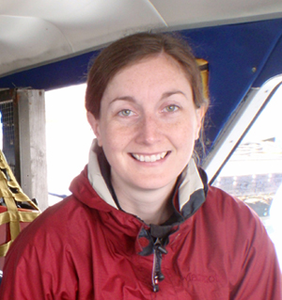Q&A with Prof. Catherine West
 Catherine West is a research associate professor in the Anthropology Department and Archaeology Program with affiliation with the Marine program.
Catherine West is a research associate professor in the Anthropology Department and Archaeology Program with affiliation with the Marine program.
Q: Talk about your past and present research!
A: When I started grad school, I knew that I wanted to use zthe animal bones in archaeological sites to understand how past people interacted with local resources and environments. When I was a graduate student, my research focused on the effects of climate change on past fisheries in the Gulf of Alaska and how people adapted their fisheries to cooling and warming periods. I’m really interested in how northern communities have adapted their subsistence practices to changing climate both in the past and today.
One of my central interests is how we can apply animal bone records to contemporary environmental concerns – doing applied zooarchaeology. People living in the Gulf of Alaska are deeply concerned about warming, especially in the ocean. In the last five years, marine heat heaves have dramatically affected marine life across the Gulf of Alaska and Bering Sea, and animal species are either disappearing or struggling terribly. This affects the huge commercial fisheries that are fundamental to economic and social life across the North Pacific Ocean and into the Bering Sea.
Q: What is the new NSF Grant that you received?

A: This grant is funded by a new NSF division called Navigating the New Arctic, which is concerned with the effects of changing climate change, economics, and international relations in the Arctic. It’s also concerned with collaboration and knowledge co-production with Indigenous communities across the Arctic, especially the western North American Arctic. This interdisciplinary project examines the history of the Pacific cod fishery in the North Pacific Ocean. The cod fishery, which is really economically important, has suffered during recent marine heat waves, and my resource management collaborators are interested in knowing if we can look to the past to understand what might happen in the future as marine temperatures continue to increase.
The main goal of this project is to be collaborative. To answer our questions we are working closely with Pacific cod managers at the Alaska Fisheries Science Center to design our research program. We are a team of archaeologists, a paleo-climatologist, genomicists, chemists, and climatologist Bruce Anderson, who’s in our Department of Earth and Environment here at BU. Together we will use contemporary fisheries data, the historical record, and archaeological fish remains to understand the dynamics of the ancient and modern ecosystems, in an effort to extend our understanding of how climate influences fish populations.
Q: How does your team plan to carry out this research?
A: Most fisheries are managed using data for the last 30 years. We would like to push that back to a thousand or maybe even five or 6000 years to see if we can identify trends in marine temperatures and how both fish and people responded to those changes. The first step was here at BU in 2020 when I had a Pardee Center Faculty Fellowship and I hosted a symposium to discuss whether long-term data can inform modern fishery management (it’s on YouTube!). And based on this symposium, we wrote this NSF grant. In January we will all convene in Seattle to design our research projects and discuss their relevance to cod management. In the summer of 2023 we will start gathering data: some people will go in the field in Alaska to interview and work with indigenous Aleut people, while others of us will go to museums to collect archeological samples. Then we’ll reconvene again in a year to share our data with each other.